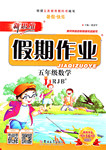题目内容
A speech on how to prevent the global warming ________ in the school hall this weekend.
A. is given B. give C. has been given D. will be given
D

 新思维假期作业寒假吉林大学出版社系列答案
新思维假期作业寒假吉林大学出版社系列答案Below is a page adapted from an English dictionary.
Important words to learn:E Essential I improver A Advanced
Pump
noun [C] DEVICE 1 A a piece of equipment which is
1 A a piece of equipment which is
used to cause liquid, air or gas to move from one place
gas pump SHOE 2[USUALLY PLURAL]US (UK COURT SHOE)
2[USUALLY PLURAL]US (UK COURT SHOE)
8 type of plain shoe with a raised HEEL and no way of
fastening it to the foot which is worn by women
3 [USUALLY PLURAL] type of flat shoe, like a BALIET dancer’s shoe when is worn by women 4 [USUALLY PLURAL]UK a flat·shoe made of heavy cloth, which is worn by children for doing sports.
verb LIQUID/GAS 1 [T USUALLY·ADV/PREP] to force
1 [T USUALLY·ADV/PREP] to force
liquid or gas to move somewhere:our latest machine can
pump a hundred gallors a minute , o The new wine is
pumped into stirage tanks.o The heart pumos blood
through the arteries/round the body. INFORMATION 2[T]
2[T]
INFORMAL to keep asking someone for information,
especially in a way that is not direce:She was pumping me
for details of the new projece.
Idioms pump sb’s hand to SHAKE someone’s hand
(="hold" their hand and move it up and down, espacially
In order to greet them)·pump lron INFORMAL to lift
Heavy weights for exercise: These days both men and
Women pump iron far fitnets.
Pharsal verbs pump sth into sth to spend
Money trying to make something operate succesfully:
They had been pumpinh money into the business for some
Years without seeing any results.
Pump sth out(M)REMOVE 1 to remove water or other
1 to remove water or other
liquid from something using a pump:We took turns
pumping out the boat.PRODUCE 2 INFORMAL DISAPPROVING
2 INFORMAL DISAPPROVING
to produce words or loud music in a way that is repeated,
forceful and continuous: The government keeps pumping
out the same old propaganda.O The car radio was
pumping out music with a heacy beat.
Pump out sth someone’s stomach is pumped out, a
Poisonous substance is removed from it by being-sucked
Through a tube. She had to go to hospital
Stomach pumped out.
Pump sth up [M] INFORMAL to make someone feel more
contident or excited: He was offering them advince and
trying to pump them up.O[R]The players were pumping
themselves up by singing the national anthem, before the
game.
Pump sth up[M]1 to fill something with air using a
pump: Have you pumped up the balloons yet?O I must
pump the tyres up on my bike.2 INFORMAL to increase
something by a large amount:The US was able to pump
up exports.O Let’s pump up the tolume a bit!
Pump-action /pamp ek/ n/adjective describes a device which operates by forcing song especially air ,in or out of a closed space or container, a pump-action shotgun , a pump action
Pump priming noun specialized the activity of helping a business ,programm ,economy etc to develop by giving it money. The government is carding small,pump-priming grants to single moter who are starting their own businesses.
Pun
noun a humorous use of a word or phrase which has several meanings or which sound like another word:she made a couple of dreadful puns. This is a well-known joke based on a pun “What’s black and white and red all over A newspaper
Verb to make a pun
Punch
Noun (c)a forceful hit with a fist (="closed" hand) she gave him a punch lik on us in the nose effect
2 U the power to be interesting and have a strong effect on people ,I felt the performance speech presntation lacked punch DRnk 3 a cold or hot drink made by mixing fruit juices pieces of frut and often wine or other alcoholic drinks tool 4 a piece of equoce which cuts boles in a maena by pushing a piece of met through it a ticket punch have you seen the hole puneh anywhere?
Verb(t) hit 1 to hit someone or something with your FIST (="closed" hand);He punched him in the stomach.2 MALY US to hit with your fingers the bugins on a telephone or the kdys on a keys on a keyboard USE TOCL make a hole in something with a special piece of equipment:I was just punching holes in some sheets of paper .This belt’s too big .I’ll have to punch an extra hole in it.
Idioms punch sb’s lights out informal to hit someone repeatedly very hard punch the clock us to put a card into a special machine to record the times you amive at and leave work:After 17 years of punching the clock,he just disappeared one morning and was mever heard from again.
【小题1】
What does the word“pump”mean in “He ran in every five minutes to pump me about the case”?
| A.Talk with | B.ask for information. | C.Listen to | D.Provide with evidence |
When Sally says“The TV propram kept pumping out commercials”,she may be______.
| A.excited | B.interested | C.annoyed | D.annoyed |
What will the government most probably provide if it is engaged in a pump-priming program?
| A.sums of money | B.Raw materials |
| C.informative and significant | D.intereing and powerful |
When Sylvia says“His speech was OK but it had no real punch”,she thinks it was not_____.
| A.fluent and impressive | B.logical and moving |
| C.informative and significant | D.interestitng and powerful |